Writer: Sami Anteroinen, Photos: Unilever, Marika Lindström
How do you ensure that your products utilize sustainable packaging solutions at all times? Marika Lindström, Procurement VP, Packaging and Beauty & Personal Care at Unilever, says that Unilever has both paper and board as well as plastics related sustainability targets.
“We want to have a deforestation-free supply chain for woodbased packaging by 2023. For plastics, we want an overall plastic reduction of 100 kilotonnes by 2025, 50 per cent virgin plastic reduction, 100 per cent recyclability and 25 per cent post-consumer recycling inclusion by 2025,” she says. For Unilever, sourcing paper and board packaging in a sustainable manner supports its commitment to zero net deforestation.
In 2019, 97 per cent of the directly purchased paper and board packaging materials used by the company came from certified sustainably managed forests or were made from recycled fibre. When it comes to the eminent rise of fibre-based packaging, Unilever sees the role of fibre-based packaging increasing in the future as the company keeps reducing plastic. “Fibre-based materials have good recyclability and recycling infrastructure. We need to ensure a full chain of custody and transparency in the supply chain to make sure that we are deforestation-free,” Lindström says.
Running parallel to the fibre-based approach, Unilever is engaged in carrying out its “Less plastic. Better plastic. No plastic.” internal framework.
Shared mindset, common goals
Unilever relies on its wide network of suppliers to be sustainable also and to pursue low carbon practices. After all, making the circular economy a reality requires massive global cooperation.
“We expect our suppliers to drive towards a similar aspiration to Unilever in the journey towards the circular economy, both in fibre- and plastic-based packaging materials,” confirms Lindström.
Metsä Board is a long-term supplier to Unilever, with the industry’s most ambitious sustainability target setting of 100 per cent fossil free mills by 2030.
Lindström assesses that Metsä Board’s sustainability drive matches Unilever’s mindset very well. “For example we’ve had great success with Metsä Board with the packaging of the Vegetarian Butcher brand. Using new coating technology, the packaging has been made more sustainable,” she says.
Butcher boost
The material used in the Vegetarian Butcher is MetsäBoard Prime FBB EB, a fibre-based eco-barrier alternative to replace plastic materials in many end uses. In essence, it’s a barrier board that can be collected and recycled in standard paper and paperboard waste streams and is also home compostable.

